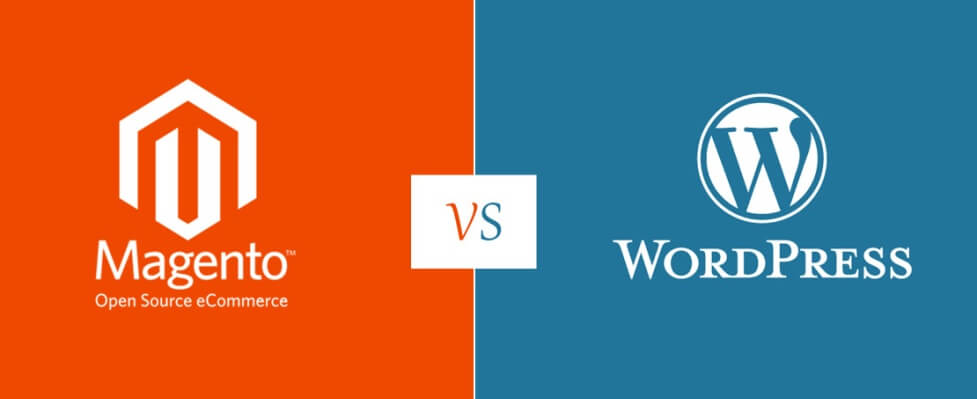Magento and WordPress both are big names in the field of content management. Both are being followed by a number of developers and preferred by a number of businesses to build their online CMS-based products. With the features that have never been seen before in the space of CMS and the functional capacity, quality and range offered by both of these are full of innovation and oriented towards user needs – making both of these the most coveted and valued content management systems, quite approvingly.
Building ecommerce websites on CMSs like these offer a fine range of benefits to both developers and non-technical people. As these offer an interactive and effortless platform to put up with ecommerce development – allowing a lot of flexibility and commitment in approaching the solution.The best part is, the e-commerce website enabled with one of these CMSs allows you to update your inventory on the fly, upload new products and information, integrate options and run your SEO campaign without much difficulty.
Now, if we compare Magento and WordPress as solutions for building e-commerce CMS, we will find them in two different leagues in terms of offerings and traits as you will find different approaches towards web development while using both of them. But, whether you go with Magento or WordPress, at last, you are most likely to reach one fine solution that best fits your choices and preferences with e-commerce development. Moving further, to learn how and which CMS would prove more beneficial in your equation of utility and benefits, let’s find out how they differ in their offerings and what’s better for you based on those differences in your craft and act of online commerce.
To that, here’s a head to head comparison between Magento and WordPress based on different factors:
If you have a big product in your mind and you are looking to serve a large number of users with extensive features by your side, it’s better to go with Magento. This is because Magento is far dependable than WordPress to build big and complex sites as it allows you to go with rich functionality and expansive features – all built to commit to intense integrations and ranging resource supplies you need to put up within your project.
How much do you think you are willing to invest? Well, both of the frameworks are free and open-source if you are looking to just go with the basic features. However, if you are moving beyond the first layer of offerings, Magento comes with the freemium option which makes you pay for selective features. While on the other hand, with WordPress almost everything is free. Also, Magento requires dedicated hosting, which can add on to your cost of development.
So, if you have issues with the budget, WordPress should be your best.
What’s your timeline? How soon you need to build your e-commerce product? If you want it to be unfolded fast it’s better to go with WordPress as Magento web development can take more time because of its density and complexity. While WordPress supported WooCommerce theoretically allows you to build a product just in a day’s time!
If you can afford a bigger server capacity you can go with Magento, which tends to work better with more space and higher data handling capacity. However, as WordPress works with the lighter codebase and more conventional themes and with smaller plug-ins, you can go with reduced space options with the latter and achieve your set of goals.
The more the number of admins and contributors you need to set-up in your store, the better if you go with WordPress as it allows you to easily add a number of users, with its receptive policies supporting roles and permissions.
What level of skill do you have access to? This is a major determinant in choosing the framework you would like to go with. With Magento, you would require hiring a Magento developer with immersive coding skills and the one who has proven skills in the domain of e-commerce. However, working with WordPress is quite easy as its development-friendly features require least technical efforts and research by the developer and thus you can go with a WordPress developer with fewer skills to make it to your goal.
Takeaway
No one technology serves you with a complete solution and you get different traits in different frameworks that make them inferior or superior in some aspect as compared to the other. Magento, as we know, is a powerful, open-source e-commerce platform which is popular for its robust and scalable feature offerings. It is more known for allowing heavier and complex e-commerce solutions using a wide array of features and extensions it has to offer. However, WordPress grew from a basic blogging platform to a wholly customizable web framework driven by a host of plugins offering it extended functionality. Which makes it flexible and easy to use and allows it to prove more accessible to users.
On the downside, it does not offer as much of support as Magento does while building complex applications. And of course,factors of security and consistency with WordPress development are not as noticeable (both in terms of accessibility and application) as they are with Magento.
Final Words
All that sums up to the fact that it all depends on your needs and preferences to build your e-commerce product, which would decide which platform is better for you. Which further extends to the factor of availability and accessibility of right developers and resources that play a decisive role in making it a winning endeavor for you.


